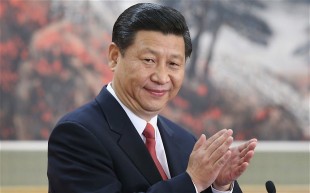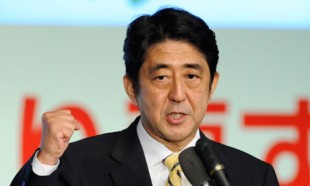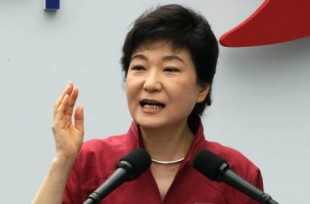[East Asia Report] Three major East Asian nations come under new leadership
类别: All, Asia, Contribution, East Asia, News, Opinion, Politics
标签: chinese next president xi jinping communist party leader, east asia hawkish new elected presidents, east asia major power countries new leaders, east asia major power states new leaders, east asia new leaders, east asian countries new leadership, park geun-hye south korea new first female president, political changes in east asia leadership, shinzo abe japanese new elected prime minister
2012 is a big year for East Asian Countries, as the three major power states on the region have chosen their new leaders.
In November, Xi Jinping took the reins of Chinese Communist Party and the Military. Xi will be elected president of the PRC at the National People’s Congress (NPC) in March 2013.
This will bring him to lead a country with the fastest growing economy and, if International Monetary Fund’s prediction is true, world’s largest economy by 2016, surpassing the United States.
While recently in Japan, another Asian Economic Giant, Lower House of Parliament voted for the return of Shinzo Abe as Prime Minister on Wednesday (Dec. 26), replacing Yoshihiko Noda. Abe promises for a revival of Japan’s economy.
His winning will bring the conservative trend back to Japanese politics. Abe is known for his nationalistic agenda and his call for a revision of Japan’s pacifist constitution.
Abe resigned from the post of Prime Minister in 2007 for health reason.
Earlier on December, South Koreans elected their first female president, Park Geun-hye, from the ruling Saenuri Party, on Wednesday (Dec. 19). Park will be intronised as President on February 2013, replacing her Party colleague, current President Lee Myung Bak.
She said on her campaign that her policy will be focused on economy and the stability of Korean peninsula.
As both Japanese and South Koreans elected their hawkish new leaders, the tensions between the two countries over the dispute of Dokdo Islets for Korean or Takeshima for Japanese, as well as the issue of comfort women are feared to escalate in the days to come.
In addition to the disagreement over history held by Japanese and South Korean, Abe’s desire to rearm Japan would increase the anxiousness of his South Korean neighbor.
Japan and China also are involved on territorial dispute over Senkaku Island or Diaoyu in Chinese.
Regardless of their disputes, the three major East Asian countries have interest on keeping Korean Peninsula stable for the effort to boost their economy. But for this to happen, another important player has to be counted in, North Korea.
On December 12, North Korea successfully launched a rocket that was part of the scenario for power legitimacy of its new heir to the throne , Kim Jong Un, to his own people and to the world. North Korea nuclear program development is believed to have the ability to reach the U.S. west coast. Responding to the launch, International Leaders call for more stringent sanction on North Korea. Up until today, UN Security Council has not yet come up with any resolution on this issue, as China is using its veto power to raise its reluctance to add sanctions to its ally.
What to expect in 2013?
Will North Korea Nuclear issue smoothen Abe’s agenda to rearm Japan? Will China keep its stand for North Korea or will grow tired of its little brother’s belligerence? Only time will tell.
But along with the love-hate relationship between the three Asian Major Countries over the security issues and economic cooperation, the presence of World’s Superpower, the United States, in the region as North Koreans biggest enemy, China’s economic rival and close ally of Japan and South Korea would keep animating East Asian politics.
Meidyana Rayana Intern Reporter news@theasian.asia
Related Posts
 Indonesian students asked to join a conference slated for July in Daejon, South Korea
Indonesian students asked to join a conference slated for July in Daejon, South Korea A guide to experience skiing at budget price in Korea
A guide to experience skiing at budget price in Korea [Indonesia Report] Eighth anniversary of tsunami observed
[Indonesia Report] Eighth anniversary of tsunami observed  [Indonesia Report] Second grandson born to Presidential couple
[Indonesia Report] Second grandson born to Presidential couple South Koreans elect first female President
South Koreans elect first female President [Indonesia Report] Sentarum Lake recommended for those wishing to enjoy Indonesia’s natural beauty
[Indonesia Report] Sentarum Lake recommended for those wishing to enjoy Indonesia’s natural beauty  [Indonesia Report] A lot of memorable things happen for Indonesia during 2012
[Indonesia Report] A lot of memorable things happen for Indonesia during 2012 [Indonesia Report] Indonesian parliamentary delegation visits Palestine
[Indonesia Report] Indonesian parliamentary delegation visits Palestine  Italian Mafia godfather caught in Bali, Indonesia
Italian Mafia godfather caught in Bali, Indonesia [Indonesia Report] Former Indonesian minister suspected of corruption
[Indonesia Report] Former Indonesian minister suspected of corruption [Indonesia Report] Indonesia concerned about NK rocket launch
[Indonesia Report] Indonesia concerned about NK rocket launch [Indonesia Report] UN asks Indonesia to reduce traffic accidents
[Indonesia Report] UN asks Indonesia to reduce traffic accidents  [Indonesia Report] Indonesian documentary film used in Australian high schools as education material
[Indonesia Report] Indonesian documentary film used in Australian high schools as education material [Indonesia Report] Ukrainian arrested for taking part in gathering of Free Papua Movement
[Indonesia Report] Ukrainian arrested for taking part in gathering of Free Papua Movement Designing good education system is a quest for all governments
Designing good education system is a quest for all governments  [Indonesia Report] University graduates hard to find jobs due to their inability
[Indonesia Report] University graduates hard to find jobs due to their inability [Indonesia Report] Gov’t efforts to curb deforestation paid off
[Indonesia Report] Gov’t efforts to curb deforestation paid off [Korea Report] My first experience of snow in Seoul as romantic as I imagined
[Korea Report] My first experience of snow in Seoul as romantic as I imagined [Indonesia Report] Death of human rights activist 8-year ago still remains unresolved
[Indonesia Report] Death of human rights activist 8-year ago still remains unresolved  [Korea Report] Seoul Central Mosque is a tourist attraction
[Korea Report] Seoul Central Mosque is a tourist attraction [Korea Report] Mini market selling world food in Itaewon is a great comfort for foreigners
[Korea Report] Mini market selling world food in Itaewon is a great comfort for foreigners [Indonesia Report] Nasi Kuning, an Indonesian delicacy for breakfast
[Indonesia Report] Nasi Kuning, an Indonesian delicacy for breakfast













































